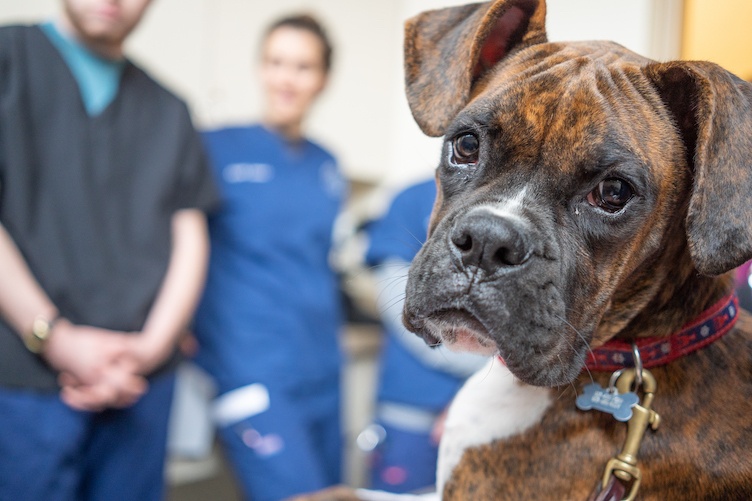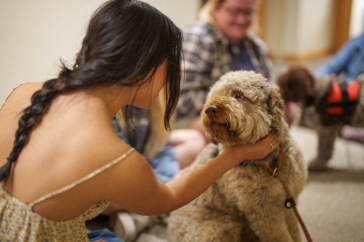
Researchers at UNH’s New Hampshire Veterinary Diagnostic Laboratory (NHVDL) and Hubbard Center for Genome Studies (HCGS) may have made significant progress in better understanding a respiratory syndrome that has affected hundreds of dogs throughout the country and has thus far confounded veterinarians.
The UNH researchers identified a small portion of the genome of a previously uncharacterized bacteria that may be causing the illness, using genetic sequencing of samples from 70 dogs in New Hampshire, Rhode Island and Massachusetts from the last two years (30 of the dogs were from New Hampshire and were affected last year, while the 40 from the other two states showed signs of respiratory illness this year).
Researchers believe the bacterium may be host adapted and potentially part of the dog microbiome and has recently developed the capacity to cause disease. Symptoms of infection in dogs include a cough that can linger for several weeks, runny eyes and sneezing. A very small subset of dogs have died after a long bout of this illness that is then complicated or superimposed with a severe acute pneumonia.
New Hampshire is one of at least 10 states throughout the country to have reported cases, which are estimated to be in the thousands nationwide (official numbers aren’t obtainable because there is no definitive test for the illness yet and because the symptoms often mirror those of many other ailments.)
"A finding like this is significant. You work at a state university to do work that you believe in, that is impactful and that you think has value, is engaging and interesting – and this really ticks all those boxes."
There is still a lot of work to do to verify the discovery, David Needle, pathology section chief at the NHVDL and clinical associate professor in the College of Life Sciences and Agriculture (COLSA), says. But the early findings are encouraging – and potentially game-changing.
“A finding like this is potentially pretty exciting, even though we still have to see how it develops to a place where we are comfortable saying this is a pathogen in the syndrome,” Needle says. “But a finding like this is significant. You work at a state university to do work that you believe in, that is impactful and that you think has value, is engaging and interesting – and this really ticks all those boxes.”
The discovery was something of a needle in a genomic haystack. Because it is so small, the bacterium is particularly hard to find and sequence, Needle says. Initial sequencing of the 30 samples from dogs in New Hampshire didn’t reveal any known pathogens.
It was graduate student Lawrence Gordon at the HCGS who broke through to make the critical discovery when he noted that a small segment of genetic material from one atypical bacterial species was common in 21 of the 30 initial samples.
The hope is that identifying the bacterium can ultimately lead to determining the right course of treatment for infected dogs. If it is decided definitively that this unknown bacterium is causing some proportion of the noted respiratory syndrome, in-depth research can begin to find the proper medicine to combat it, which would be a significant breakthrough for veterinarians throughout the country.
"We've always had a mission at the Hubbard Center for Genome Studies to support community needs, and this has been an opportunity to really do that in a very obvious way. It really shows off what a facility at a university like this can do."
Because of the discovery, UNH researchers are now receiving samples from many of the states that have been impacted by the illness, which will allow the team to develop a more specific test for this unique potential pathogen.
The discovery would not have been possible were it not for the partnership between the NHVDL and the HCGS, Needle says. Each is a regarded as a leader in its area nationally and a significant differentiator for UNH, but projects like this illustrate the power of combining forces.
The HCGS found itself in the spotlight during COVID as UNH’s response to the pandemic and on-campus testing operation gained significant attention – positively impacting not only the UNH community but many others throughout New Hampshire, as well – and this case presents a similar opportunity to shine.
“We’ve always had a mission at the Hubbard Center for Genome Studies to support community needs, and this has been an opportunity to really do that in a very obvious way, just like COVID was,” Kelley Thomas, director of the HCGS, says. “It really shows off what a facility at a university like this can do.”
Contributors to the investigation from the NHVDL include Robert Gibson, director of the lab, as well as Kari Hartman, Tessa Baillargeon and Cassidy Gendron, who have teamed up with Thomas, Gordon, Joe Sevigny, Muriel Kelly, Krystalynne Morris, Adane Nigatu, Stephen Simpson and Jeff Hall of the HCGS.
“This is all really a great expression of the years-long partnership between the veterinary diagnostic lab and the team at the Hubbard Center for Genome Studies,” Needle says. “All of my research hinges on genomics, and Kelley is an incredibly brilliant, generous and thoughtful collaborator.”
Beyond the fact that this discovery could potentially help solve a problem with major national implications, shining a light on the groundbreaking work being done on UNH’s campus, it also highlights the focus on ensuring a healthy community that drives the work at both the NHVDL and HCGS.
“This work really ties back to something we are all focused on for the UNH community, which is the One Health approach. The concept is everything matters and is connected – you have to have healthy environments, healthy animals, healthy crops and healthy people,” Thomas says. “Genomics plays a big role in making that happen, and the work the veterinary diagnostic lab does has a big swath of that, as well. I think it’s a great time for this kind of work taking place at UNH.”
-
Written By:
Keith Testa | UNH Marketing | keith.testa@unh.edu

















































